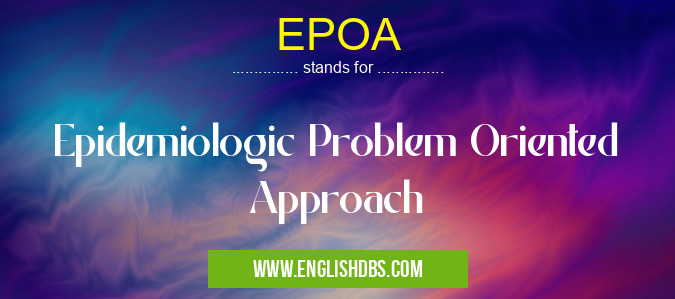What does EPOA mean in UNCLASSIFIED
EPOA stands for Epidemiologic Problem Oriented Approach. It is a methodology used in public health and medical research to identify, investigate, and address health issues in communities and populations. The approach involves systematically gathering and analyzing data to understand the causes and effects of health problems, and to develop and evaluate interventions to prevent or control them.

EPOA meaning in Unclassified in Miscellaneous
EPOA mostly used in an acronym Unclassified in Category Miscellaneous that means Epidemiologic Problem Oriented Approach
Shorthand: EPOA,
Full Form: Epidemiologic Problem Oriented Approach
For more information of "Epidemiologic Problem Oriented Approach", see the section below.
Key Principles of EPOA
- Problem-oriented: Focuses on specific health problems or issues, rather than general health status.
- Epidemiological: Utilizes epidemiological methods to collect and analyze data on the occurrence, distribution, and determinants of health problems.
- Community-based: Involves collaboration with communities and stakeholders to identify and address health needs.
- Evidence-based: Relies on scientific evidence and data to inform decision-making and interventions.
- Interdisciplinary: Brings together expertise from various fields, including epidemiology, public health, clinical medicine, and social sciences.
Steps in EPOA
1. Problem Identification:
- Define the health problem or issue to be addressed.
- Gather preliminary data to describe the problem and its magnitude.
2. Problem Analysis:
- Conduct an epidemiological investigation to identify risk factors, underlying causes, and patterns of disease occurrence.
- Analyze data to understand the distribution, determinants, and potential interventions for the problem.
3. Intervention Development:
- Develop and implement evidence-based interventions to prevent or control the health problem.
- Involve stakeholders and community members in the design and implementation of interventions.
4. Intervention Evaluation:
- Monitor and evaluate the effectiveness of interventions using appropriate epidemiological methods.
- Make necessary adjustments based on evaluation findings.
Benefits of EPOA
- Provides a systematic and structured approach to addressing health problems.
- Facilitates the identification of effective interventions based on scientific evidence.
- Promotes collaboration and community engagement in health promotion and disease prevention.
- Helps prioritize health issues and allocate resources effectively.
Essential Questions and Answers on Epidemiologic Problem Oriented Approach in "MISCELLANEOUS»UNFILED"
What is the Epidemiologic Problem Oriented Approach (EPOA)?
EPOA is a systematic approach to public health problem-solving that uses epidemiologic methods to identify and address health problems. It involves defining the problem, collecting and analyzing data, developing and implementing interventions, and evaluating their effectiveness.
What are the key steps in the EPOA process?
The key steps in EPOA include:
- Defining the problem
- Collecting and analyzing data
- Developing and implementing interventions
- Evaluating the effectiveness of interventions
How is EPOA used to address public health problems?
EPOA can be used to address a wide range of public health problems, such as infectious diseases, chronic diseases, and environmental health hazards. It can be used to identify the causes of these problems, develop effective interventions, and evaluate their impact.
What are the benefits of using EPOA?
The benefits of using EPOA include:
- It can help to identify the root causes of public health problems.
- It can help to develop and implement effective interventions.
- It can help to evaluate the effectiveness of interventions.
- It can help to improve the efficiency and effectiveness of public health programs.
What are the challenges of using EPOA?
The challenges of using EPOA include:
- It can be time-consuming and resource-intensive.
- It can be difficult to collect and analyze data accurately.
- It can be difficult to develop and implement effective interventions.
- It can be difficult to evaluate the effectiveness of interventions.
Final Words: EPOA is a valuable approach for addressing health problems and improving population health. By following its principles and steps, public health professionals and researchers can effectively identify, investigate, and address health issues, leading to the development and implementation of effective interventions.
